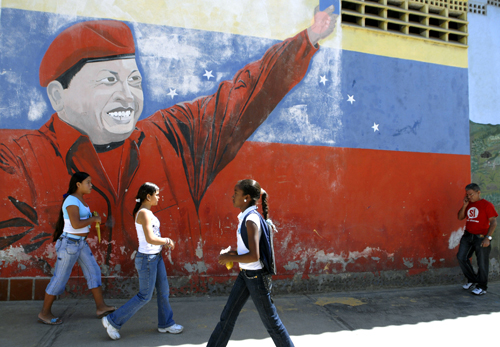
(AP Photo/Gregorio Marrero)
Among the more important questions to surface in the wake of Hugo Chávez’s death on March 5: Will chavismo survive? The answer, usually given in the affirmative, frequently invokes a previous era of Latin American history.
For example, a column on the London Review of Book’s website, “Chavez Hasta Siempre,” draws a parallel to Che Guevara, martyred saint of the Cuban Revolution. Meanwhile a columnist for BBC Mundo stated that Chávez was “the Peron of the twenty-first century.” Miami Herald columnist Andres Oppenheimer takes this logic a step further, arguing that chavismo’s future will mirror that of Peronism in Argentina because each man had a military background, shifted his outlook from fascist to leftist, and happened onto a commodity boom that enabled lavish handouts to followers. Herein lies the problem.
Chavismo is more tied to the individual who started it than any other successful movement in Latin American history. Simón Bolívar may be remembered as “The Liberator” of Latin America, but it was the Argentine José de San Martín who won more battles en route to the region shaking free of Spain. Juan Domingo would not have become Perón were it not for his wife Eva’s eloquence: her balconied pleas of “Compañeros!” more than once turned the jilted crowds back in his favor, and her untimely death from cancer created the sympathy Juan needed to extend his political life. Now try to imagine Fidel without Che.
Chávez, by contrast, had no sidekick, only the faceless cronies whom he appointed to replace seasoned government ministers. Chávez was a one-man show, both before the cameras and behind them.
Extending the life of chavismo may require more than aping El Comandante’s rhetoric and antics, it will require knowing who to pay off. And I suspect that this task will be made doubly difficult because Venezuela has a semi-authoritarian system. Thanks to Chávez’s hyper-political mobilization of chavistas, the democratic hoards expect their subsidies, and they could quickly turn against a leader who doesn’t give it to them. At the same time, the flag bearer of chavismo will need to cater to what Bruce Bueno de Mesquita terms “the selectorate”: the cabal of military and business leaders whose loyalty tends to be rented, not bought. Yes, Mr. Oppenheimer, chavismo may survive, but leading the movement will require more deft politicking than its founder displayed.